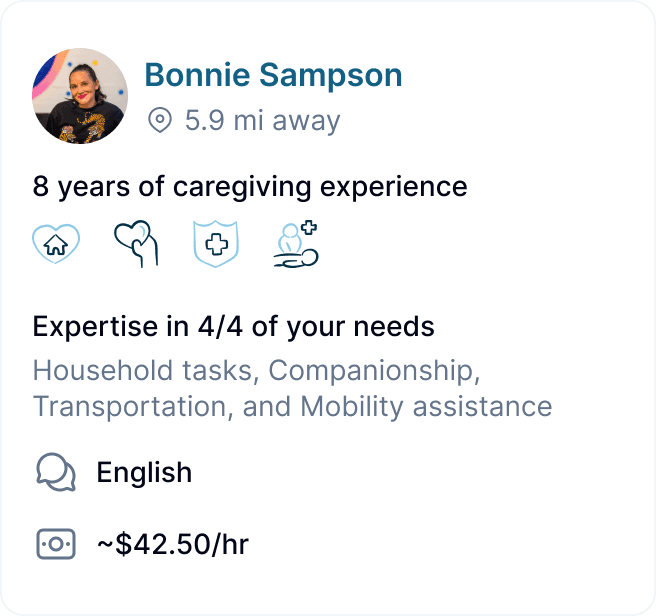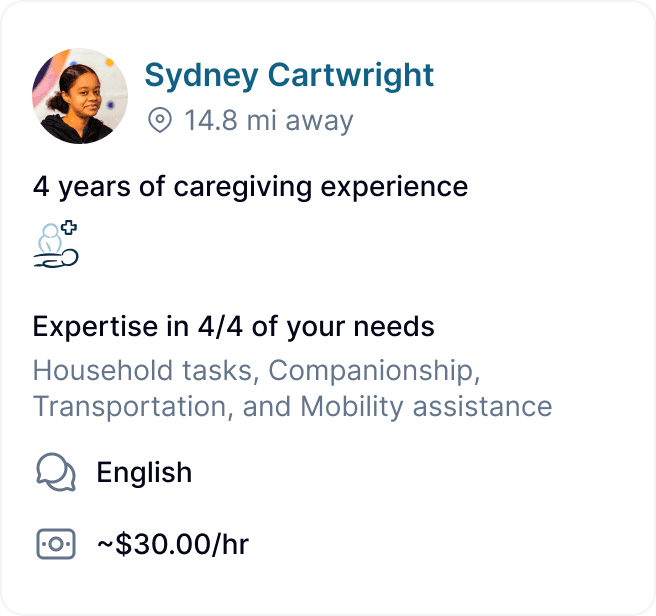Aging Parents and Elder Care: A Starter Pack for Care Novices
Apr 29, 2025
Apr 29, 2025



Caring for aging parents is a journey that many adult children eventually face, often unexpectedly. The transition from being cared for to becoming a caregiver can be overwhelming, especially for those with no prior experience.
This guide offers a practical, compassionate starter pack for novices, blending expert advice, actionable tips, and insights into the different services (e.g., home care, adult day services) that can offer support to families every step of the way.
Understanding the Need for Care
Recognizing when your parent needs help is not always straightforward. Sometimes, your loved one may ask for assistance; other times, you might notice subtle changes—missed medications, difficulty keeping up with household chores, or increased forgetfulness. If you’re concerned about their physical or mental health, encourage a visit to a healthcare provider and offer to help with logistics, such as scheduling appointments or providing transportation.
Remember, you don’t have to shoulder the entire burden alone. Many communities offer resources, from caregivers and transportation services to geriatric care managers who can help coordinate care and share responsibilities among family, friends, or neighbors.
Building a Daily Routine
A consistent daily routine is a cornerstone of elder care. Predictable patterns provide comfort and reduce anxiety, particularly for those experiencing cognitive decline. Establish routines that include:
Gentle wake-up times and morning hygiene
Scheduled medication and meals at the same times each day
Simple visual schedules for those with memory issues
Familiar settings for meals and activities
Evening routines are equally important. Soft music, a warm drink, and calming hygiene rituals can help signal the transition to bedtime, which is especially helpful for those prone to “sundowning” (increased confusion in the evening).
Promoting Physical and Emotional Well-being
Movement remains vital at every age. Encourage gentle physical activity to maintain strength, mobility, and independence:
Chair-based stretches and seated exercises
Short, supported walks in safe environments
Simple hand exercises to preserve grip strength
Water exercises or adapted tai chi for those with joint pain
Physical activity not only supports health but also uplifts the spirit. Make these moments enjoyable-play favorite music, celebrate small achievements, and use the time to connect emotionally.
Social engagement is equally important. Encourage your parent to maintain friendships, participate in community activities, or simply enjoy regular conversations with family. Loneliness can be as detrimental as physical ailments. See here for more tips on combatting loneliness among older adults.
Home Safety and Modifications
Safety is paramount. Start by identifying and addressing immediate risks:
Remove trip hazards and ensure clear walkways
Install grab bars in bathrooms and non-slip mats in showers
Improve lighting throughout the home
Consider safety systems like medical alert devices
Introduce changes gradually to avoid overwhelming your parent. Implement one new organizational or safety system at a time, and involve your parent in decisions to preserve their sense of control and dignity.
Setting Boundaries and Managing Relationships
Caregiving can blur boundaries between parent and child. It’s essential to establish clear limits about what you are comfortable doing, especially with personal tasks like bathing or toileting. Open, respectful communication helps maintain a healthy relationship and prevents resentment. When tasks exceed your comfort zone, consider bringing in outside help.
When More Help Is Needed
Sometimes, your parent’s needs may surpass what you can provide. In these cases, options include:
Hiring in-home caregivers for assistance with daily activities
Utilizing adult day care centers for socialization and supervision
Exploring senior living or assisted living facilities if home care is no longer feasible.
The cost of care varies. In-home care typically ranges from $35 to $60 per hour, with many providers offering flexible schedules and minimum hour requirements.
Self-Care for Caregivers
Don’t neglect your own well-being. Caregiving is demanding, and burnout is a real risk. Schedule regular breaks, ask for help, and make time for activities that recharge you. Remember, caring for yourself is not selfish-it’s essential for sustaining your ability to care for your parent.
Getting Started: Your Elder Care Starter Pack
Assess Needs: Observe your parent’s routines, health, and home environment. Identify areas where help is needed.
Open Communication: Talk honestly with your parent about their wishes, preferences, and concerns.
Create a Routine: Establish consistent daily patterns for meals, medication, and activities.
Make Safety Modifications: Address immediate hazards and gradually implement safety improvements.
Encourage Activity: Integrate gentle movement and social engagement into each day.
Set Boundaries: Define what you can and cannot do, and communicate these boundaries clearly.
Seek Support: Explore community resources, professional caregivers, and platforms like Clara Home Care for additional help.
Prioritize Self-Care: Schedule time for your own health and well-being.
Final Thoughts
Stepping into the role of caregiver for an aging parent is both a profound responsibility and an opportunity for deep connection. While the path can be challenging, you don’t have to walk it alone.
By building routines, prioritizing safety, seeking support, and leveraging modern solutions to access more affordable professional home care support (such as Clara), you can ensure your loved one receives compassionate, dignified care-and that you remain resilient and supported along the way.
Caring for aging parents is a journey that many adult children eventually face, often unexpectedly. The transition from being cared for to becoming a caregiver can be overwhelming, especially for those with no prior experience.
This guide offers a practical, compassionate starter pack for novices, blending expert advice, actionable tips, and insights into the different services (e.g., home care, adult day services) that can offer support to families every step of the way.
Understanding the Need for Care
Recognizing when your parent needs help is not always straightforward. Sometimes, your loved one may ask for assistance; other times, you might notice subtle changes—missed medications, difficulty keeping up with household chores, or increased forgetfulness. If you’re concerned about their physical or mental health, encourage a visit to a healthcare provider and offer to help with logistics, such as scheduling appointments or providing transportation.
Remember, you don’t have to shoulder the entire burden alone. Many communities offer resources, from caregivers and transportation services to geriatric care managers who can help coordinate care and share responsibilities among family, friends, or neighbors.
Building a Daily Routine
A consistent daily routine is a cornerstone of elder care. Predictable patterns provide comfort and reduce anxiety, particularly for those experiencing cognitive decline. Establish routines that include:
Gentle wake-up times and morning hygiene
Scheduled medication and meals at the same times each day
Simple visual schedules for those with memory issues
Familiar settings for meals and activities
Evening routines are equally important. Soft music, a warm drink, and calming hygiene rituals can help signal the transition to bedtime, which is especially helpful for those prone to “sundowning” (increased confusion in the evening).
Promoting Physical and Emotional Well-being
Movement remains vital at every age. Encourage gentle physical activity to maintain strength, mobility, and independence:
Chair-based stretches and seated exercises
Short, supported walks in safe environments
Simple hand exercises to preserve grip strength
Water exercises or adapted tai chi for those with joint pain
Physical activity not only supports health but also uplifts the spirit. Make these moments enjoyable-play favorite music, celebrate small achievements, and use the time to connect emotionally.
Social engagement is equally important. Encourage your parent to maintain friendships, participate in community activities, or simply enjoy regular conversations with family. Loneliness can be as detrimental as physical ailments. See here for more tips on combatting loneliness among older adults.
Home Safety and Modifications
Safety is paramount. Start by identifying and addressing immediate risks:
Remove trip hazards and ensure clear walkways
Install grab bars in bathrooms and non-slip mats in showers
Improve lighting throughout the home
Consider safety systems like medical alert devices
Introduce changes gradually to avoid overwhelming your parent. Implement one new organizational or safety system at a time, and involve your parent in decisions to preserve their sense of control and dignity.
Setting Boundaries and Managing Relationships
Caregiving can blur boundaries between parent and child. It’s essential to establish clear limits about what you are comfortable doing, especially with personal tasks like bathing or toileting. Open, respectful communication helps maintain a healthy relationship and prevents resentment. When tasks exceed your comfort zone, consider bringing in outside help.
When More Help Is Needed
Sometimes, your parent’s needs may surpass what you can provide. In these cases, options include:
Hiring in-home caregivers for assistance with daily activities
Utilizing adult day care centers for socialization and supervision
Exploring senior living or assisted living facilities if home care is no longer feasible.
The cost of care varies. In-home care typically ranges from $35 to $60 per hour, with many providers offering flexible schedules and minimum hour requirements.
Self-Care for Caregivers
Don’t neglect your own well-being. Caregiving is demanding, and burnout is a real risk. Schedule regular breaks, ask for help, and make time for activities that recharge you. Remember, caring for yourself is not selfish-it’s essential for sustaining your ability to care for your parent.
Getting Started: Your Elder Care Starter Pack
Assess Needs: Observe your parent’s routines, health, and home environment. Identify areas where help is needed.
Open Communication: Talk honestly with your parent about their wishes, preferences, and concerns.
Create a Routine: Establish consistent daily patterns for meals, medication, and activities.
Make Safety Modifications: Address immediate hazards and gradually implement safety improvements.
Encourage Activity: Integrate gentle movement and social engagement into each day.
Set Boundaries: Define what you can and cannot do, and communicate these boundaries clearly.
Seek Support: Explore community resources, professional caregivers, and platforms like Clara Home Care for additional help.
Prioritize Self-Care: Schedule time for your own health and well-being.
Final Thoughts
Stepping into the role of caregiver for an aging parent is both a profound responsibility and an opportunity for deep connection. While the path can be challenging, you don’t have to walk it alone.
By building routines, prioritizing safety, seeking support, and leveraging modern solutions to access more affordable professional home care support (such as Clara), you can ensure your loved one receives compassionate, dignified care-and that you remain resilient and supported along the way.
Caring for aging parents is a journey that many adult children eventually face, often unexpectedly. The transition from being cared for to becoming a caregiver can be overwhelming, especially for those with no prior experience.
This guide offers a practical, compassionate starter pack for novices, blending expert advice, actionable tips, and insights into the different services (e.g., home care, adult day services) that can offer support to families every step of the way.
Understanding the Need for Care
Recognizing when your parent needs help is not always straightforward. Sometimes, your loved one may ask for assistance; other times, you might notice subtle changes—missed medications, difficulty keeping up with household chores, or increased forgetfulness. If you’re concerned about their physical or mental health, encourage a visit to a healthcare provider and offer to help with logistics, such as scheduling appointments or providing transportation.
Remember, you don’t have to shoulder the entire burden alone. Many communities offer resources, from caregivers and transportation services to geriatric care managers who can help coordinate care and share responsibilities among family, friends, or neighbors.
Building a Daily Routine
A consistent daily routine is a cornerstone of elder care. Predictable patterns provide comfort and reduce anxiety, particularly for those experiencing cognitive decline. Establish routines that include:
Gentle wake-up times and morning hygiene
Scheduled medication and meals at the same times each day
Simple visual schedules for those with memory issues
Familiar settings for meals and activities
Evening routines are equally important. Soft music, a warm drink, and calming hygiene rituals can help signal the transition to bedtime, which is especially helpful for those prone to “sundowning” (increased confusion in the evening).
Promoting Physical and Emotional Well-being
Movement remains vital at every age. Encourage gentle physical activity to maintain strength, mobility, and independence:
Chair-based stretches and seated exercises
Short, supported walks in safe environments
Simple hand exercises to preserve grip strength
Water exercises or adapted tai chi for those with joint pain
Physical activity not only supports health but also uplifts the spirit. Make these moments enjoyable-play favorite music, celebrate small achievements, and use the time to connect emotionally.
Social engagement is equally important. Encourage your parent to maintain friendships, participate in community activities, or simply enjoy regular conversations with family. Loneliness can be as detrimental as physical ailments. See here for more tips on combatting loneliness among older adults.
Home Safety and Modifications
Safety is paramount. Start by identifying and addressing immediate risks:
Remove trip hazards and ensure clear walkways
Install grab bars in bathrooms and non-slip mats in showers
Improve lighting throughout the home
Consider safety systems like medical alert devices
Introduce changes gradually to avoid overwhelming your parent. Implement one new organizational or safety system at a time, and involve your parent in decisions to preserve their sense of control and dignity.
Setting Boundaries and Managing Relationships
Caregiving can blur boundaries between parent and child. It’s essential to establish clear limits about what you are comfortable doing, especially with personal tasks like bathing or toileting. Open, respectful communication helps maintain a healthy relationship and prevents resentment. When tasks exceed your comfort zone, consider bringing in outside help.
When More Help Is Needed
Sometimes, your parent’s needs may surpass what you can provide. In these cases, options include:
Hiring in-home caregivers for assistance with daily activities
Utilizing adult day care centers for socialization and supervision
Exploring senior living or assisted living facilities if home care is no longer feasible.
The cost of care varies. In-home care typically ranges from $35 to $60 per hour, with many providers offering flexible schedules and minimum hour requirements.
Self-Care for Caregivers
Don’t neglect your own well-being. Caregiving is demanding, and burnout is a real risk. Schedule regular breaks, ask for help, and make time for activities that recharge you. Remember, caring for yourself is not selfish-it’s essential for sustaining your ability to care for your parent.
Getting Started: Your Elder Care Starter Pack
Assess Needs: Observe your parent’s routines, health, and home environment. Identify areas where help is needed.
Open Communication: Talk honestly with your parent about their wishes, preferences, and concerns.
Create a Routine: Establish consistent daily patterns for meals, medication, and activities.
Make Safety Modifications: Address immediate hazards and gradually implement safety improvements.
Encourage Activity: Integrate gentle movement and social engagement into each day.
Set Boundaries: Define what you can and cannot do, and communicate these boundaries clearly.
Seek Support: Explore community resources, professional caregivers, and platforms like Clara Home Care for additional help.
Prioritize Self-Care: Schedule time for your own health and well-being.
Final Thoughts
Stepping into the role of caregiver for an aging parent is both a profound responsibility and an opportunity for deep connection. While the path can be challenging, you don’t have to walk it alone.
By building routines, prioritizing safety, seeking support, and leveraging modern solutions to access more affordable professional home care support (such as Clara), you can ensure your loved one receives compassionate, dignified care-and that you remain resilient and supported along the way.
More about caring for family
More about caring for family


Can a Family Member Be Paid to Be a Caretaker in California?



Lowrie Hilladakis


When Is It Time for Assisted Living—or Is In-Home Care the Better Choice?



Lowrie Hilladakis


Making Tough Choices Easier: The Power of Advance Care Planning



Lowrie Hilladakis


Understanding the Emotional Impact of Caring for Aging Parents



Vanessa Bustos


Balancing Work and Caregiving: Strategies for Busy Families



Vanessa Bustos


Coordinating Long-Distance Care: A Guide to Supporting Loved Ones from Afar



Jon Levinson


Setting Boundaries Without Guilt: A Family Caregiver's Guide



Vanessa Bustos


How to Foster Cooperation Among Family Members in Senior Care



Jon Levinson


Respite Care Explained: A Short Guide for Family Caregivers



Lowrie Hilladakis


Showing Yourself Love: How Hiring a Caregiver Can Be an Act of Self-Care



Jon Levinson
GEt started for free
Better care starts with Clara.
Find, hire, and pay top-notch caregivers without the headache for a price that fits your budget.



GEt started for free
Better care starts with Clara.
Find, hire, and pay top-notch caregivers without the headache for a price that fits your budget.



GEt started for free
Better care starts with Clara.
Find, hire, and pay top-notch caregivers without the headache for a price that fits your budget.

